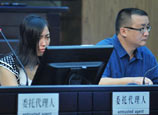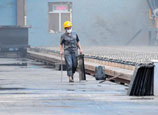
BEIJING, July 16 (Xinhua) -- Chinese national political advisors Tuesday warned about the risks of sacrificing the quality of urbanization for speed.
The members to the National Committee of the Chinese People's Political Consultative Conference (CPPCC) discussed problems and risks of the country's fast urbanization at a special meeting held here.
As of last year about 52 percent of Chinese people have lived in urban areas, up from 20 percent some 30 years ago.
The same process took Britain about 100 years, the United States 60 years and France 65 years.
"Problems that had occurred in different stages of urbanization in these developed countries have mixed together in China due to the speed of growth," said Wang Guangqian, a member of the Standing Committee of the CPPCC National Committee, at the meeting.
The situation is more complicated and harder for the government to manage, Wang said.
The country had undergone several rounds of "construction craze" and should avoid history repeating itself in the future's urbanization process, Wang said.
"Especially, we should be wary of local governments pushing forwards urbanization driven by blind pursuit of economic growth figures," he said.
Political advisors called for more focus on the quality of urbanization.
In some places, urbanization was simply the development of real estate projects and industrial parks, said Justin Yifu Lin, a political advisor and former senior vice president of the World Bank.
Chinese cities should find out the genuine source of economic growth through the urbanization drive so that local governments will gain revenues through tax instead of land, Lin said.
He suggested that cities should establish their unique economic competitiveness and encourage private and foreign investors through preferential policies.
Several political advisors stressed the importance of developing small cities and townships.
China's urbanization has been unbalanced as big cities and megacities have expanded by 30 to 50 percent over the past few years but small towns have grown slowly, said Li Yuefeng, a senior political advisor.
Governments of these small cities and townships should be given more power and independence to seek a development pattern based on local conditions, instead of being pushed to grow bigger, said Zhu Yongxin, also a political advisor.
A number of political advisors also noted that the well-being of migrant workers has been an outstanding issue in the country's urbanization.
Although they live in cities, they have not become real urban residents in terms of social security, employment and children's education, said Lai Ming, a political advisor.
Further policy reforms are needed to help migrant workers and their families settle in cities and take a more active part in city life, he said.
Political advisors also called for more attention to environmental issues in cities, including air and water quality as well as food safety.
















 College student car models show youthful vigor
College student car models show youthful vigor


![]()
